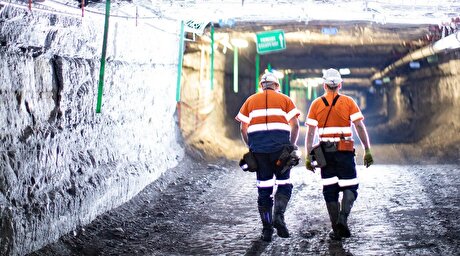
Casting and steel – The future is digital
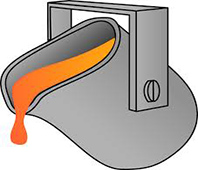
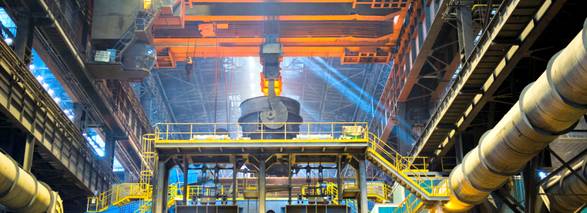
Digital transformation and Industry 4.0 are among the major topics of the future in the metallurgy industries. Increasingly sophisticated sensor technology is providing more and more data from the production process in foundries and steel mills. Every cast slab and every rolled steel strip requires thousands of data-x-items of data. Even a comparatively smaller steel mill like Saarstahl’s at the Völklingen site produces more than 100 terabytes of process data a year with around two and a half million tons of steel products – a data volume corresponding to the contents of around 30 million telephone directories.
It is no longer simply the accuracy of the data that is the basis for information but the sheer volume as well. Evaluating data, recognising patterns and obtaining information is no longer possible with conventional IT methods. As big data analysis, artificial intelligence and networked cloud systems are replacing the data centres and relational databases of the past, the digital monitoring of machines and systems reduces maintenance costs, increases efficiency and has the potential to optimise products. Cloud technologies, with their storage volumes that are subject to hardly any limits, can serve to make it possible to generate more revenue from operational product and machine data with new services.
Metallurgical plant manufacturers such as the SMS group hope that digital services will compensate them for the weakening of their core business due to worldwide overcapacities in steel. Steel manufacturers and foundries link purchasing, sales, production and logistics in a cost-saving manner with hardware-based IT application of Industry 4.0. The development of digital channels puts the customer at the heart of the business.
For Essen-based steel and industrial group ThyssenKrupp, the interlinked steel factory with a digital channel to the customer has already been achieved. The Industry 4.0 hot rolling mill Hoesch Hohenlimburg in Hagen is interlinked with the precursor material supplier Hüttenwerke Krupp Mannesmann (HKM) in Duisburg. The steel slabs are cast in Duisburg, then rolled in Hagen into medium-wide strip, which is then processed by sheet metal processors into components for the automotive industry. Even during the process, customers can use a PC, smartphone or tablet PC to determine when his steel strip goes into production and make changes to material properties such as sheet thickness and width at short notice.
Casters in the data stream
Generating process knowledge from data with the support of Big Data and implementing solutions in Industry 4.0 is also on the agenda of aluminium and iron casters. Solutions such as process optimisation through coupling of the casting process simulation with data-driven process models are in demand – a research approach that Magma of Aachen, a company specialising in simulation software, is pursuing in the IProguss research project. Intelligent energy and resource efficiency is always an issue, especially for a process-related energy-intensive company such as an iron foundry. Professor Dierk Hartmann, Kempten University is working on an optimised solution for the Adam Hönig iron foundry. The foundry uses barcodes that are scanned by employees on their smartphones and transferred to a database. In this way, new process parameters can be added to the production areas and the production process can be tracked. The aim is to improve energy and resource efficiency by reducing overproduction of liquid metal
“Foundries are experienced in dealing with data-driven business models”, says Heinz Nelissen, President of GIFA 2019 and NEWCAST as well as Managing Director of Vesuvius GmbH, Foseco Foundry Division in Borken. Approaches related to machine-to-machine communication, automation and robot use, computer-aided technologies, and product and process development will therefore also be a focus at GIFA 2019.
How Industry 4.0 can look in practice can be seen at Karl Casper Guss in Pforzheim. The foundry produces a wide range of hand-moulded parts with unit weights from 100 kg up to 9.5 t. In order to be able to react quickly to changing customer requirements while guaranteeing high production reliability and quality at the same time, Casper Guss relies on an integrated Industry 4.0 solution with three pillars:
1. Interlinking of all operating equipment
2. Planning and control of processes with 100% traceability through the ERP system
3. As an interface to the extranet, a web portal that gives customers access to production information.
Linking of all systems from end to end makes it possible to plan individual orders directly, as Managing Director Felix Casper describes. The ERP system automatically checks feasibility upon receipt of the order, thus ensuring a high level of adherence to delivery dates. Feedback from all production steps improves throughput and increases quality. Using the web portal, customers can call up production information on their orders from the extranet and directly enter additions as well as changes to dates or quantities. “Interlinking of the customer systems with our own systems leads to faster and more reliable processing of orders”, summarises Casper.
FeroLabs: Industry 4.0 for steel production
Agile companies from the start-up scene also have their eye on tapping new business areas with digitalisation. Digital technology opens the door to potential disruptors in the metal industry as well. Voice control via mobile phones along with face recognition in social media such as Facebook, Amazon, Google and Apple is finding its way into the steel industry, thanks to clever company founders: machine learning is one of the most successful sub-areas of artificial intelligence. While self-learning algorithms were mainly a topic of academic research until a few years ago, today they are increasingly making their way into our everyday lives as well as industry.
“With Fero Software, our customers are able to better understand their production process and thus increase their profitability”, says Tim Eschert. As an application engineer at FeroLabs in Düsseldorf, the industrial engineer with a master’s degree from RWTH Aachen University is something like the vicegere of the New York start-up in Germany. FeroLabs uses what are known as statistical machine learning (ML) methods. Eschert sees them as a bridge between conventional analysis methods such as Six Sigma, which have so far been used in production, and the modern technology of machine learning. “The area of statistical ML combines these two fields, and we at Fero are proud to be the first to bring these methods from academic research into industrial manufacturing”, says the FeroLabs manager.
In the area of steel, the start-up has applied and researched the use of its software in various applications, as Eschert explains. These include, for example, reduction of surface oxidation (cinder) and the prediction of material properties in a hot wide strip mill, quality improvement in a tube mill, detection of inclusion defects in a wire mill and optimisation of alloy usage in a rod mill. “At present, the application of alloy optimisation is the area in which we are most advanced in terms of implementation and scaling, but the other areas are already fully operational”, reports Eschert.
Steel customers include Gerdau in Brazil, which produces steel on the scale of ThyssenKrupp and is known for its good quality. For FeroLabs, the focus there is mainly on reducing production costs by means of ML while maintaining the same quality. As Eschert reports, FeroLabs combined data from several different databases to get a complete picture of the entire production process from the steel mill to the rolling mill. “The merged data set contained hundreds of parameters, including process and sensor data as well as quality metrics. Using data from a few months, Fero automatically trained machine learning modules, which proved to be very accurate in predicting target key figures”, explains Eschert.
Today at Gerdau, shop floor managers, quality management teams and process engineers use Fero software to understand complex, non-linear relationships between production and target key figures, for example. “They are currently using these findings to carry out simulations within the Fero software and to determine the optimum production parameters for each product quality”, reports Eschert.
Mecorad: Industry 4.0 in the rolling mill
Dr Marc Banaszak is Managing Director of the Cologne-based start-up Mecorad. The spin-off company of the Technical University of Cologne will support operators of hot rolling mills with a high-precision measuring system and applications based around it. In addition to higher product quality, the goal is the lowest possible loss of production value as well as a production that is interlinked down to the end user. During production, the Mecorad measuring system measures flat steel with micrometre accuracy, which is a truly demanding task. In hot-rolling steel production steam, stirred-up dust and thermal radiation have so far prevented the glowing steel strips from being precisely measured during the production process. The company wants to solve the problem using radar sensors. At every point in the process, a measurement precise to the micrometre takes place in real time. Unlike previously used laser or camera techniques, radar is capable of penetrating the surrounding air contaminated by steam and dense dust. Interferences and disturbances caused by strong vibrations, for example, are eliminated by the algorithms developed by Mecorad, assures Banaszak.
Building on these measurements, the company offers further services along the production chain. These include software for specialised measurements, process analyses and control algorithms, such as control of the roll gap or roll calibre. Coordination with external players such as scrap processors can also be managed using Mecorad applications. “Our system is designed to enable services to the end user and to integrate them into production, for example by automating order processing”, Banaszak promises.
The goal of founder Banaszek is to support the entire production system with digitalisation. “Using our technology, we are tackling two fundamental problems in steel production: excessively high production value losses due to inaccurate measurements and a lack of control processes, as well as a great deal of catching up to do in terms of digitalisation”, says the Mecorad Managing Director.
SMS Digital: Catching up in the digital field
The dynamic nature of young start-ups is also spurring on established players. Plant builder SMS, for example, uses what is known as the design-thinking approach to implement new digital services as they are typically pursued by digital start-ups. That’s no accident. Two years ago, with the support of Etventure, a management consultancy specialising in digital transformation and part of EY (Ernst & Young), the leading plant builder set up its own subsidiary to act as a “creative forge”, SMS Digital. The slogan of the young creative minds based in Düsseldorf: “We tackle the challenge of digital transformation and Industry 4.0”. Their mission: to develop software for Industry 4.0 and digital services for steel companies all over the world.
SMS Digital has already developed the first applications and software solutions to the point of readiness for the market, such as the intelligent alarm management “Smart Alarm”. In order to achieve maximum plant availability, it is important for plant operators to monitor the status of the plant. However, conventional visualisation systems with human-machine interfaces (HMIs) do not always meet this requirement, as SMS found. With the new alarm management, all plants of a steel company can be integrated into one system. The plant status is evaluated by trend analyses, with time-consuming training not being necessary thanks to simple and intuitive operation. In the event of an alarm, a text message and e-mail are sent automatically. The digital forge is currently working on predicting alarms and identifying the triggering alarm in the event of many alarms occurring at once.
The fact that traditional plant builder SMS group is serious about digitalisation is demonstrated at the top management level. SMS CEO Burkhard Dahmen appointed Bremen professor Katja Windt to the Executive Board in April 2018. As Managing Director of Digitalisation, the mechanical engineer with a doctorate is responsible for the Digital Solutions as well as the Electrical Systems and Automation divisions of the SMS group. As a professor at Jacobs University Bremen, the expert for production technology already implemented digitalisation and logistics projects for customers from the steel industry.
Opportunity of digitalisation – danger of disruption
The digitalisation of production creates a dynamic ecosystem. The potential opens up opportunities for new competitors from the start-up scene to offer new services in order to make established companies vulnerable – even to the point of disrupting existing customer-supplier relationships.
“Digitalisation and disruption are affecting every company and every industry”, says Philipp Depiereux, founder and CEO of Etventure. The only difference is the speed of change. “What the publishing and music industries have already painfully experienced may also affect steel mills and foundries in the future.” This was also demonstrated by examples from other rather traditional sectors such as the heating industry. In this case, start-up Thermondo used a good, digital offer to insert itself between the end user and established providers in a very brief time and is today the largest installer of heating systems in Germany.
Depiereux, who together with Etventure advised not only plant manufacturer SMS but also steel trader Klöckner and assisted in establishing a digital business model with a start-up in Berlin, is certain of the following: “Steel mills and foundries need to be aware of one thing: Everything that can be digitalised will eventually be digitalised. They have to ask themselves whether they want to stand by and watch this change or whether they would rather take action themselves before a digital player attacks their core business”, warns Depiereux. The digital expert also has good advice for established companies: “Above all, they need to understand what these large digital players and start-ups do differently and make these success factors their own.”
It is not convincing to Depiereux that steel manufacturers and foundries, forges and rolling mills, as classic representatives of the old economy with their heavy and bulky products, appear at first glance to be less willing to embrace the new business models of digital transformation. “Selling a steel slab digitally is of course more complex than doing the same with a book. But that doesn’t mean that it can’t succeed and that someone will inevitably do it at some point.”


BHP, Vale accused of ‘cheating’ UK law firm out of $1.7 billion in fees
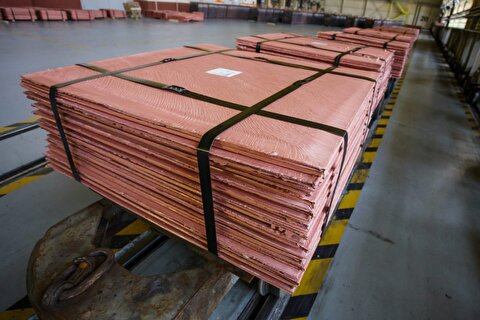
Trump tariff surprise triggers implosion of massive copper trade

Eldorado to kick off $1B Skouries mine production in early 2026

Newmont nets $100M payment related Akyem mine sale
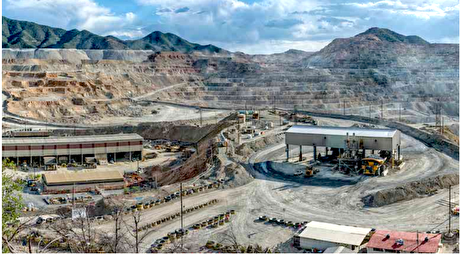
Southern Copper eyes $10.2B Mexico investment pending talks
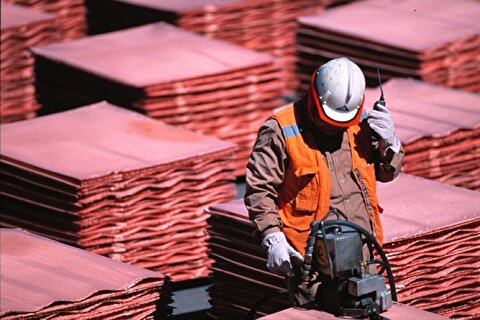
Copper price collapses by 20% as US excludes refined metal from tariffs

St Augustine PFS confirms ‘world-class’ potential of Kingking project with $4.2B value

Maxus expands land holdings at Quarry antimony project in British Columbia

First Quantum scores $1B streaming deal with Royal Gold

Caterpillar sees US tariff hit of up to $1.5 billion this year
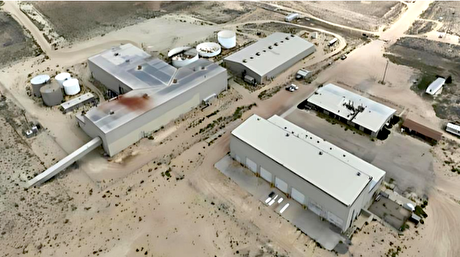
Uranium Energy’s Sweetwater plant on fast track for in-situ mining approval
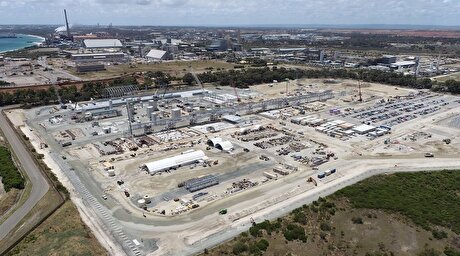
Tianqi Lithium Australia JV says it is prioritizing long-term viability of refinery

First Quantum scores $1B streaming deal with Royal Gold
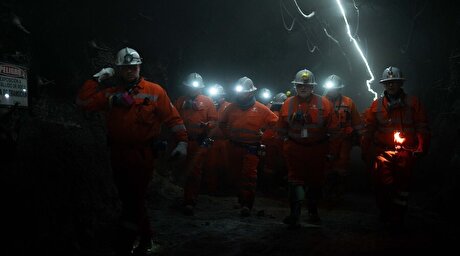
One dead, five missing after collapse at Chile copper mine

Eldorado to kick off $1B Skouries mine production in early 2026

Newmont nets $100M payment related Akyem mine sale
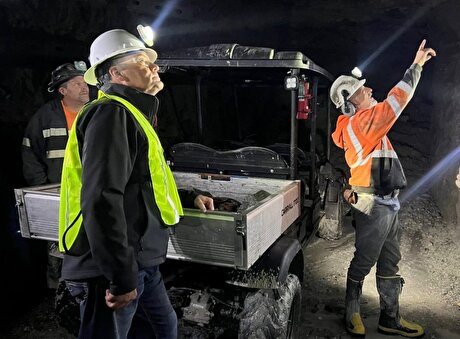
Idaho Strategic rises on gold property acquisition from Hecla

Goldman told clients to go long copper a day before price plunge

Gold price rebounds nearly 2% on US payrolls data

Caterpillar sees US tariff hit of up to $1.5 billion this year

Uranium Energy’s Sweetwater plant on fast track for in-situ mining approval

Tianqi Lithium Australia JV says it is prioritizing long-term viability of refinery

First Quantum scores $1B streaming deal with Royal Gold

One dead, five missing after collapse at Chile copper mine

Eldorado to kick off $1B Skouries mine production in early 2026

Newmont nets $100M payment related Akyem mine sale

Idaho Strategic rises on gold property acquisition from Hecla

Goldman told clients to go long copper a day before price plunge














